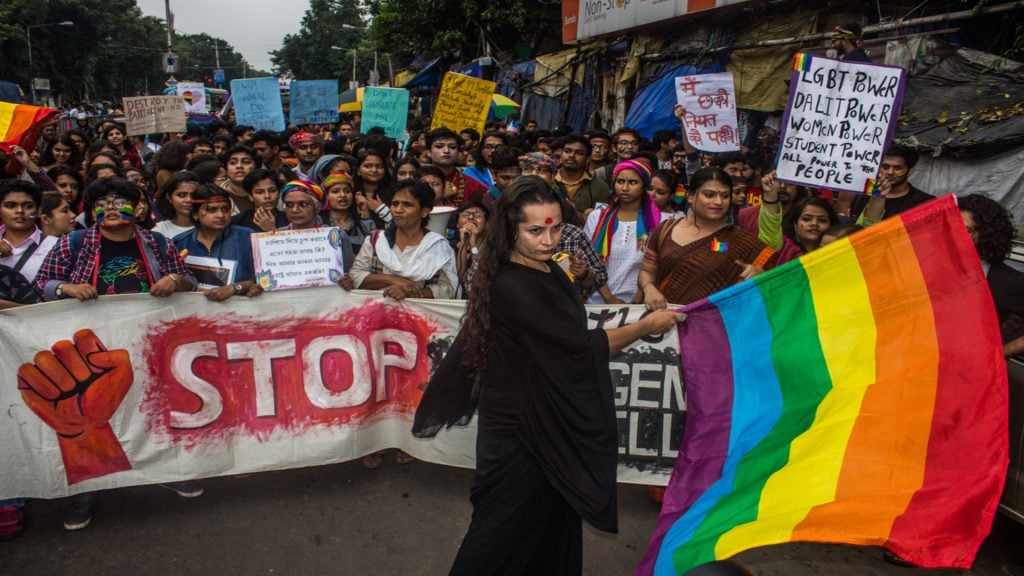Queer InFocus is a bimonthly roundup of queer news in India.
India’s LGBT Community Celebrates its 1st Independence Day with this version of the National Anthem
15th August, 2019
The Humsafar Trust, one of Asia’s first organisations working for LGBTQIA+ rights has shared a heart-warming National Anthem film. The film features activists and advocates of the LGBTQ+ community who have struggled for equality. The video can be viewed here.
Click here for full article.
Job snubs to forced surgery: India’s ‘invisible’ intersex people
16th August, 2019
Despite being recognised as a third gender with equal rights under the law in 2014, intersex people are often stigmatised and shunned many survive through begging or sex work. Daniel Mendonca, an intersex activist, has been asked about his genitals at a job interview. Intersex rights campaigners argue that their specific needs e.g. medical aid for life-saving surgeries, are largely ignored, even among the LGBTQ+ community. The intersex community in India are often misunderstood, and often confused for transgender people. The trans rights bill passed earlier this year, both describes intersex people as a type of transgender person, and there have been calls for the bill to include ‘intersex’ in the title. Activists also want to ban medically unnecessary procedures on children and for this to be included in the bill.
Click here for full article.
Indian state bans unnecessary surgery on intersex babies
28th August, 2019
An Indian state has banned sex assignment surgery on babies whose sex is not clear at birth. This move was made to protect intersex children at birth, as these surgeries can cause long-term mental and physical damage. Only two countries have banned unnecessary surgeries on children with sex variations: Portugal and Malta. Tamil Nadu’s government announced it will set up a committee of doctors, social workers and intersex activists, to ensure that the ‘exceptional clause of life-threatening situation shall not be misused.’ There are at least 10,000 intersex babies born each year in India, but infanticide, abandonment and mutilation are common.
Click here for full article.
A year after SC’s Sec 377 order, LGBT+ community waits for inclusive laws
30th August, 2019
A study by Vidhi Centre for Legal Policy has highlighted the need for victim neutrality in provisions related to sexual offences in criminal law. ‘Queering the Law: Making Indian laws LGBT+ Inclusive’ analyses India’s laws across identity, violence, family and employment. The study was to highlight discrimination that still exists in the legal system, by either enforcing the male-female binary, or discriminating against the LGBTQ+ community, and to build on legal inclusivity.

Click here for full article.
377 anniversary this week but for queers in Kashmir, there is no ‘gay liberation’
1st September, 2019
Unlike previous shutdowns in Kashmir, this one has been accompanied by a complete cutting off of mobile phones and landlines. This silence hits LGBTQ+ Kashmiris the most, with no safe spaces for them to access online. Communications blackouts hit trans people the hardest. Unlike in other parts of South Asia, there are no house or clan systems to support trans Kashmiris. On top of curfews and checkpoints, trans Kashmiris are victim to assault from military personnel and even victim to transphobic attacks, making it extremely difficult to move around. The Sonzal Welfare Trust, operated by Dr. Aijaz Ahmed Bund, serves as a safe space for the Srinagar’s LGBTQ+ community, with counselling over the phone and WhatsApp, thus supporting trans people, but with the blackout, queer Kashmiris were left in isolation. The striking down of Article 370 was seen as a victory for LGBTQ+ rights, although this was completely misled, because the Supreme Court’s verdict of Section 377 applies to the High Court of Jammu and Kashmir as well.
Click here for full article.
